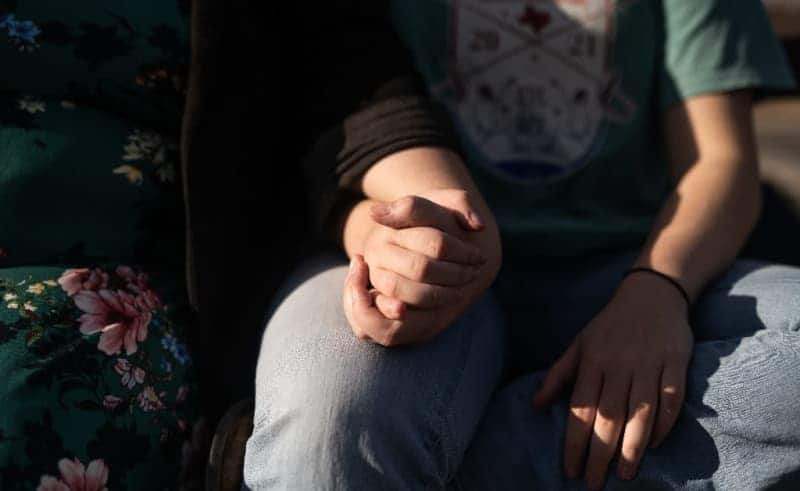AFP

Minneapolis (AFP) – With bills targeting transgender youth multiplying at an alarming rate, Mary knew it was time to leave Texas — and fast.
So she looked for places she could raise her child safely, and landed on the northern US state of Minnesota, clear across the country.
“The idea that the state (of Texas) would betray us that way, I still can't really wrap my head around that,” said Mary, sitting in a Minneapolis park with her 16-year-old child Jasper on an unusually warm April day.
“I feel like this is much, much safer,” Mary added.
Minnesota public officials have pointedly worked to make it that way, turning the state into a self-styled “refuge” for transgender children whose rights and access to medical care are being threatened elsewhere in the United States.
Mary and Jasper aren't even their real names, as the duo chose to remain anonymous when speaking to the media amid increasing hate online targeting transgender people.
Like many Texans, Mary and Jasper — who identifies as a boy, and uses they/them pronouns — have a strong affinity for the Lone Star State. And in Minnesota, they're far from family and friends.
At the same time, the warm welcome they received up north was a stark contrast from the increasingly conservative atmosphere they faced in Texas.
School officials here didn't bat an eye when Jasper wanted to use a name that didn't match their birth certificate. The ease of the whole process brought Mary to tears.
‘Coffin or closet'
As culture wars around abortion, education, racism — and now, transgender children — engulf the country, states' divergent responses are causing some families to pull up stakes.
Some Republican-controlled states have passed laws to prohibit children from using bathrooms that don't match their sex assigned at birth, despite studies that show there is no increased risk of assault, and have banned certain medical treatments.
In Texas, the governor ordered the state agency tasked with fighting child abuse to launch inquiries into the parents of transgender children — an effort currently tied up in the court system.
Meanwhile, states like California, Illinois and Minnesota have declared themselves “sanctuaries” for transgender youth.
Last week, the Minnesota legislature passed a “trans refuge” bill that would guarantee legal protection for transgender people coming to Minnesota from elsewhere for medical care.
“We're trying to not just say it's okay to be trans, but you can come here and be safe,” said Leigh Finke, Minnesota's first openly transgender lawmaker, who sponsored the initiative.
“We know what it means to force people not to be themselves, and it's coffin or closet.”
‘Takes my breath away'
Access to health care for transgender minors is “lifesaving,” said Angela Goepferd, program director for gender health at Children's Minnesota, one of the largest pediatric health systems in the United States.
Children with access to gender-affirming care “have less anxiety, less depression, they think about suicide less often and they act upon those suicidal thoughts less often,” said Goepferd.
That care can include hormone blockers to prevent the onset of puberty, birth control (to prevent menstruation), as well as estrogen or testosterone.
Gender-affirming care is a complex issue and one that defies partisan divides. Even some progressive parents say they worry about treatment being offered too early, as they fear kids could ultimately reassess their gender identity — and might regret surgery.
Surgery however “is almost exclusively reserved for people who are over the age of 18 years old,” Goepferd said, adding: “There is a big manufactured controversy around that.”
“There may be some people — and by some I mean less than one percent of older adolescents, 16 or 17 — who may access a type of surgery called a chest surgery,” Goepferd said.
“But the type of surgery that is often described in legislatures in this country is genital surgery. And that is not a type of surgery that is done in children or adolescents.”
Most important in gender-affirming care is “meeting with families, answering questions, helping figure out how to support a young person in school, in their community, with their family,” Goepferd said.
For kids who have reached puberty or older, “it may involve these medications.”
As policies further diverge between Republican- and Democratic-controlled states, Finke expects “thousands of families” to come to Minnesota.
Mary considers herself lucky: She, her husband, and Jasper had the means to leave Texas.
But she knows families “who can't and who are just holding their breath.”
Despite the upheaval, Jasper is still nostalgic about Texas, and plans on returning for vacation this summer. But Mary is hopeful Jasper will adapt to their new home.
“Every time Minnesota does something that's trans affirming, or trans welcoming, it still kind of takes my breath away,” she says.



